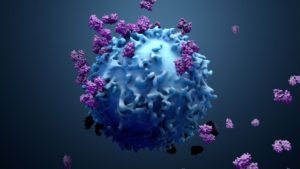S309: Identification of a Potent Covid-19 Antibody
The world has come to a halt due to the Covid-19 pandemic. People are spending time in lockdowns, businesses stay closed, schools are shut down, and there has been huge financial loss due to this. The pandemic is also taking a toll on people’s health, and it is seizing the lives of hundreds of people in almost all countries.
To get control over such a situation, researchers and organizations across the globe are working day and night to find a potential vaccine for coronavirus. One such team of researchers has started using imaging processes to identify microscopic structures and find a treatment or preventative method against Covid-19. The team found that neutralizing antibodies from survivors of SARS were successful in blocking coronaviruses like SARS-CoV-2 from penetrating into the body’s host cells.

Identification of an Antibody
With the help of cryo-electron microscopy and x-ray crystallography, the team identified 8 antibodies that may bind with the spike glycoprotein of SARS-CoV-2. With a pyramid-like structure, it helps the coronavirus from entering into the host cells. Out of these, S309 was a specific antibody that inhibited SARS-CoV-2 with success. Researchers are looking forward to using this antibody as a potent ingredient to make Covid-19 vaccine.
Producing this antibody in huge amounts is possible. If a person’s immunity does not produce this antibody naturally in the body, he/she can be given this antibody directly, or the production of this antibody can be boosted by delivering it in the body in the form of a vaccine.
About S309 Antibody
SARS-CoV-2 virus that is responsible for causing Covid-19 comes under the category of coronaviruses. There are many other coronaviruses that may infect human beings. One of the coronaviruses is SARS-CoV, which caused SARS outbreak back in the year 2003. It infected more than 8000 people and killed around 775 people. Antibody S309 was found in the blood sample of a person who had survived SARS in 2003. It is found to be related to SARS-CoV-2, which is another coronavirus responsible for causing Covid-19.
Vir Biotechnology is going for a fast track development of this antibody and planning to use it in its clinical trials. However, it still needs to be confirmed that it is safe to enter into living bodies.
At present, there are no medicines or tools approved so far for fighting against Covid-19 coronavirus. S309 has high potential because it is found in a patient who has survived SARS and not Covid-19. Several other memory B cells with monoclonal antibodies are also found in the same SARS survivor. These cells remember the pathogen they have already fought against in the past, and start a defense system to prevent re-infection.
Antibodies from the patient’s memory B cells were directed at the coronavirus protein structure. It will be helpful in identifying whether the coronavirus can recognize a cell receptor, fuse and inject the genetic component into the cells. The system of infectivity is present in the proteins of Spike surrounding the coronavirus.
According to researchers, S309 can potentially target and disable S protein, which is responsible for promoting the entry of coronavirus into the cells. It was found to engage with a part of the Spike protein located near the site of attachment with the host cell and successfully neutralized it. With the help of binding assays and cryo-electron microscopy procedures, it was found that the antibody can identify the coronavirus binding site not only in Covid-19 and SARS viruses but also in several other sarbocoviruses. By combining S309 with other weaker antibodies neutralized Covid-19 coronavirus with success.
This cocktail of multiple potential antibodies can be helpful in reducing the ability of coronavirus to produce mutants that may escape from a treatment given using a single antibody system. Whether used alone or in combination, S309 can be a successful preventive method of Covid-19 coronavirus for high-risk patients, or be used to treat an illness after getting infected.
The team that found the S309 antibody was headed by Davide Corti and David Veesler. Corti belongs to the Vir Biotechnology, Switzerland, and Veesler is from the University of Washington, Seattle. National Institutes of General Medical Sciences, Pew Biomedical Scholars Award, Burroughs Welcome Fund Award, and National Institute of Allergy & Infectious Diseases, are funding this research led by Corti and Veesler. The research paper that mentioned about the antibody was published over the internet in Nature on May 18, 2020.
We, at sepStream®, are based in the US and are dedicated to developing cost-saving solutions for efficient operations of diagnostic and radiology imaging service providers. We can streamline imaging procedures as per the industry standards lucrative for specialists as well as customers. Use our user-friendly, highly efficient, and affordable solutions to improve your patient-care system and increase your productivity manifolds. For more information, get in touch with us and let us know how we can help.